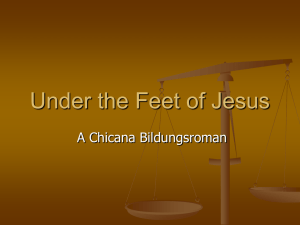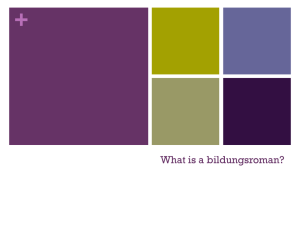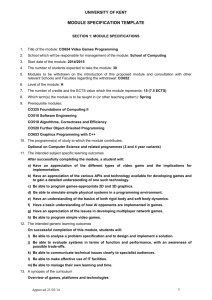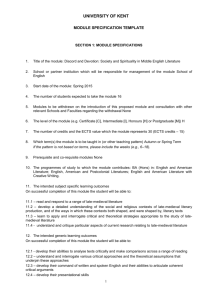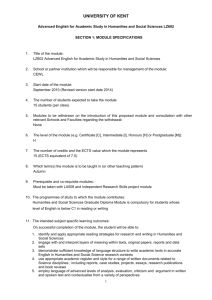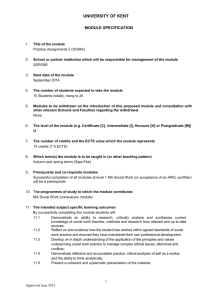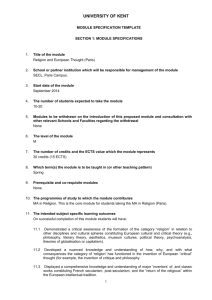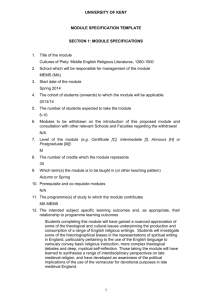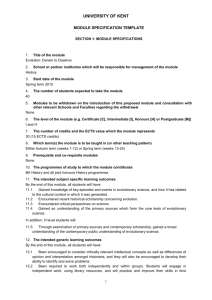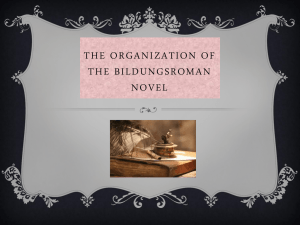UNIVERSITY OF KENT MODULE SPECIFICATION TEMPLATE
advertisement
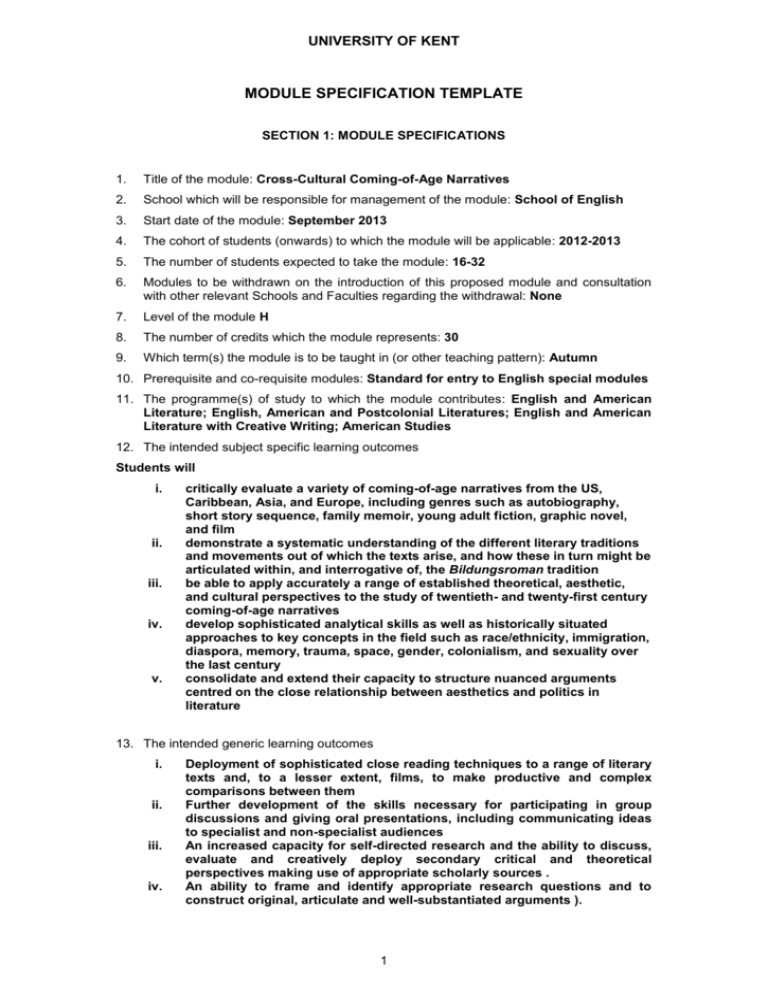
UNIVERSITY OF KENT MODULE SPECIFICATION TEMPLATE SECTION 1: MODULE SPECIFICATIONS 1. Title of the module: Cross-Cultural Coming-of-Age Narratives 2. School which will be responsible for management of the module: School of English 3. Start date of the module: September 2013 4. The cohort of students (onwards) to which the module will be applicable: 2012-2013 5. The number of students expected to take the module: 16-32 6. Modules to be withdrawn on the introduction of this proposed module and consultation with other relevant Schools and Faculties regarding the withdrawal: None 7. Level of the module H 8. The number of credits which the module represents: 30 9. Which term(s) the module is to be taught in (or other teaching pattern): Autumn 10. Prerequisite and co-requisite modules: Standard for entry to English special modules 11. The programme(s) of study to which the module contributes: English and American Literature; English, American and Postcolonial Literatures; English and American Literature with Creative Writing; American Studies 12. The intended subject specific learning outcomes Students will i. ii. iii. iv. v. critically evaluate a variety of coming-of-age narratives from the US, Caribbean, Asia, and Europe, including genres such as autobiography, short story sequence, family memoir, young adult fiction, graphic novel, and film demonstrate a systematic understanding of the different literary traditions and movements out of which the texts arise, and how these in turn might be articulated within, and interrogative of, the Bildungsroman tradition be able to apply accurately a range of established theoretical, aesthetic, and cultural perspectives to the study of twentieth- and twenty-first century coming-of-age narratives develop sophisticated analytical skills as well as historically situated approaches to key concepts in the field such as race/ethnicity, immigration, diaspora, memory, trauma, space, gender, colonialism, and sexuality over the last century consolidate and extend their capacity to structure nuanced arguments centred on the close relationship between aesthetics and politics in literature 13. The intended generic learning outcomes i. ii. iii. iv. Deployment of sophisticated close reading techniques to a range of literary texts and, to a lesser extent, films, to make productive and complex comparisons between them Further development of the skills necessary for participating in group discussions and giving oral presentations, including communicating ideas to specialist and non-specialist audiences An increased capacity for self-directed research and the ability to discuss, evaluate and creatively deploy secondary critical and theoretical perspectives making use of appropriate scholarly sources . An ability to frame and identify appropriate research questions and to construct original, articulate and well-substantiated arguments ). 1 UNIVERSITY OF KENT 14. A synopsis of the curriculum If the Bildungsroman has been criticised for being outmoded and conservative, how do contemporary writers interrogate and expand its scope and importance? Are coming-ofage narratives merely private stories or can they be read in ways which highlight their social functions, and what kind of theoretical, aesthetic and cultural perspectives can we apply to scrutinise these functions? This module will bring together a range of texts and films from the twentieth and twenty-first centuries that can be read within and against the literary tradition of the Bildungsroman or the coming-of-age narrative. Drawing on material from the US, the Caribbean, Asia and Europe, we will spend time analysing the representation of the coming-of-age experience in terms of content and form and assess the ideological functions of the Bildungsroman in a cross-cultural context. Particular attention will be given to questions of racial and ethnic identity, migration, colonialism, memory, trauma, belonging and sexuality. We will also explore the connection of the Bildungsroman with genres such as autobiography, family memoir, young adult fiction, graphic novel, and film. Writers studied in this module include Richard Wright, Jamaica Kincaid, Sandra Cisneros, Sherman Alexie, Jhumpa Lahiri, Marjane Satrapi, and we will watch films including East is East and Bend it Like Beckham. 15. Indicative Reading List Anzia Yezierska, Bread Givers (1925) Richard Wright, Black Boy (1945) Jamaica Kincaid, Lucy (1990) Maxine Hong Kingston, The Woman Warrior: Memoirs of a Girlhood among Ghosts (1976) Sandra Cisneros, The House on Mango Street (1984) Sherman Alexie, The Absolute True Diary of a Part-Time Indian (2007) Jhumpa Lahiri, The Namesake (2003) Marjane Satrapi, Persepolis: The Story of a Childhood and the Story of a Return (2000) Kapka Kassabova, Street without a Name: Childhood and Other Misadventures in Bulgaria (2008) Film Screenings: Ayub Khan Din, East is East (1999) Gurinder Chadha, Bend it Like Beckham (2002) 16. Learning and Teaching Methods, including the nature and number of contact hours and the total study hours which will be expected of students, and how these relate to achievement of the intended learning outcomes 30 contact hours over the term, consisting of ten 2-hour weekly seminars and a total of 5 two-hour workshops and/or film screenings. Students will be expected to study for a total of 25 hours per week including contact time. (Total 300 hours). Guided critical reading during the workshops and short contextualising lectures will help students acquaint themselves with the literary tradition of the Bildungsroman more broadly (12. i, ii) and the specific cultural contexts and concepts the texts of the module engage with (12. iii, iv). Small group and presentation work will complement traditional seminar discussion, to enable students to both navigate the broader themes of the course and examine in greater depth those elements that interest them most (13. ii, iii). Film screenings will encourage students to consider the ideas and areas discussed in relation to the visual medium (12. iii, 13. i). 2 UNIVERSITY OF KENT 17. Assessment methods and how these relate to testing achievement of the intended learning outcomes The module will be assessed on the basis of two essays of 2500-3000 words each (90%), with the remaining 10% coming from a seminar performance mark. There will be suggested topics/questions provided, with the option for students to construct a question in consultation with their seminar leader. In accordance with the intended module learning outcomes, the two essays will test close reading and a sensitivity to generic conventions (13. i), independent research (13. iii), and an ability to construct nuanced arguments centred on the close relationship between aesthetics, cultural context and politics (12. v, 13. iv). More specifically, the essays will show the student is able to interpret and apply a range of theoretical ideas (13. iii) in relation to the tradition of the Bildungsroman and across a variety of regions and literatures (12. i, ii) and make productive comparisons and distinctions between them (12. i, 13. i). Students will also develop their ability to explain their ideas and construct original, articulate and well-substantiated arguments in informal presentations and group work (13. ii, iv). 18. Implications for learning resources, including staff, library, IT and space Standard seminar/lecture rooms with audio-visual equipment. Much of the critical material is held in the library but some additional texts may need to be purchased. 19. The School recognises and has embedded the expectations of current disability equality legislation, and supports students with a declared disability or special educational need in its teaching. Within this module we will make reasonable adjustments wherever necessary, including additional or substitute materials, teaching modes or assessment methods for students who have declared and discussed their learning support needs. Arrangements for students with declared disabilities will be made on an individual basis, in consultation with the University’s disability/dyslexia support service, and specialist support will be provided where needed. 20. Campus(es) where module will be delivered 1: Canterbury If the module is part of a programme in a Partner College or Validated Institution, please complete the following: 21. Partner College/Validated Institution: n/a 22. University School (for cognate programmes) or Faculty (for non-cognate programmes) responsible for the programme SECTION 2: MODULE IS PART OF A PROGRAMME OF STUDY IN A UNIVERSITY SCHOOL Statement by the School Director of Learning and Teaching/School Director of Graduate Studies (as appropriate): "I confirm I have been consulted on the above module proposal and have given advice on the correct procedures and required content of module proposals" ................................................................ .............................................. Director of Learning and Teaching/Director of Graduate Date 1 Required for information purposes only. Changes of campus will not require re-approval of the module specification. 3 UNIVERSITY OF KENT Studies (delete as applicable) ………………………………………………… Print Name Statement by the Head of School: "I confirm that the School has approved the introduction of the module and, where the module is proposed by School staff, will be responsible for its resourcing" ................................................................. .............................................. Head of School Date ……………………………………………………. Print Name SECTION 3: MODULE IS PART OF A PROGRAMME IN A PARTNER COLLEGE OR VALIDATED INSTITUTION (Where the module is proposed by a Partner College/Validated Institution) Statement by the Nominated Officer of the College/Validated Institution (delete as applicable): "I confirm that the College/Validated Institution (delete as applicable) has approved the introduction of the module and will be responsible for its resourcing" ................................................................. Nominated Responsible Officer College/Validated Institution of .............................................. Partner …………………………………………………. Print Name ………………………………………………….. Post …………………………………………. Partner College/Validated Institution 4 Date UNIVERSITY OF KENT Module Specification Template Last updated November 2011 5
